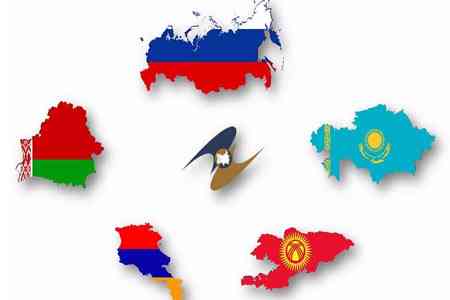


ArmInfo.The Eurasian Economic Commission (EEC) is focusing its attention on the issue of resolving the situation with international road transport in connection with changes in the conditions of stay for foreign citizens in the Russian Federation.
In a statement received by ArmInfo, the EEC notes that the Commission, acting strictly within its authority and competence, is taking all necessary measures to resolve emerging issues.
"In close cooperation with the authorized bodies of the EAEU countries, a number of operational meetings have already been held aimed at finding solutions to ensure the uninterrupted operation of carriers and the stability of the Union's internal market," the statement reads. The EEC added that work is being conducted in two areas. "First, we are working quickly to resolve the issue of lifting all restrictions on drivers of EAEU member states engaged in international road transport who have been subject to administrative sanctions under Federal Law No. 115. Second, we are working to address the issue systematically, namely, excluding drivers of EAEU member states engaged in international road transport from the new provisions of Federal Law No. 115, which regulate the period of temporary stay in the Russian Federation," the EEC noted. It is also noted that a task force composed of representatives of the EEC, authorized bodies, and the business community of EAEU member states has been established within the Commission to enable carriers from Union countries to submit information on any cases related to migration procedures during international road transport of goods. This information is being analyzed and communicated to the relevant Russian authorities to ensure a prompt resolution of the situation. Thanks to active multilateral cooperation, a number of issues related to individual international drivers were resolved promptly. "The EEC continuously monitors the situation in the Union's internal market to systematically address emerging issues. When necessary, the Commission holds operational meetings with authorized bodies to develop solutions to ensure the full functioning of the Union's internal market," the Commission concluded.
Days earlier, Armenian freight truckers held a protest in front of the Armenian government building. The protest was prompted by amendments to the Federal Law on the Legal Status of Foreign Citizens in the Russian Federation, according to which citizens of visa-free countries entering the Russian Federation for purposes other than employment (i.e., without a corresponding stamp on their migration card) may stay in the country for no more than 90 days within a 180-day period. This restriction also applies to drivers transporting freight and passengers, despite their actual employment. The truck drivers demanded that the Armenian authorities resolve the situation, which is hindering their work.
According to the Statistical Committee of the Republic of Armenia, freight traffic in Armenia in January-August 2025 increased by 1.1% compared to the same period in 2024, reaching 10,620,600 tons. Of this volume, 78.4%, or 8,330,300 tons, was accounted for by road freight transport, a 0.2% decrease compared to the same period last year. A decline was also recorded in natural gas deliveries via main pipeline, down 1.8% to 1,218,200 tons.
Freight transport by rail increased by 17.4% to 1,047,000 tons, and by air by 5% to 25.1 thousand tons.